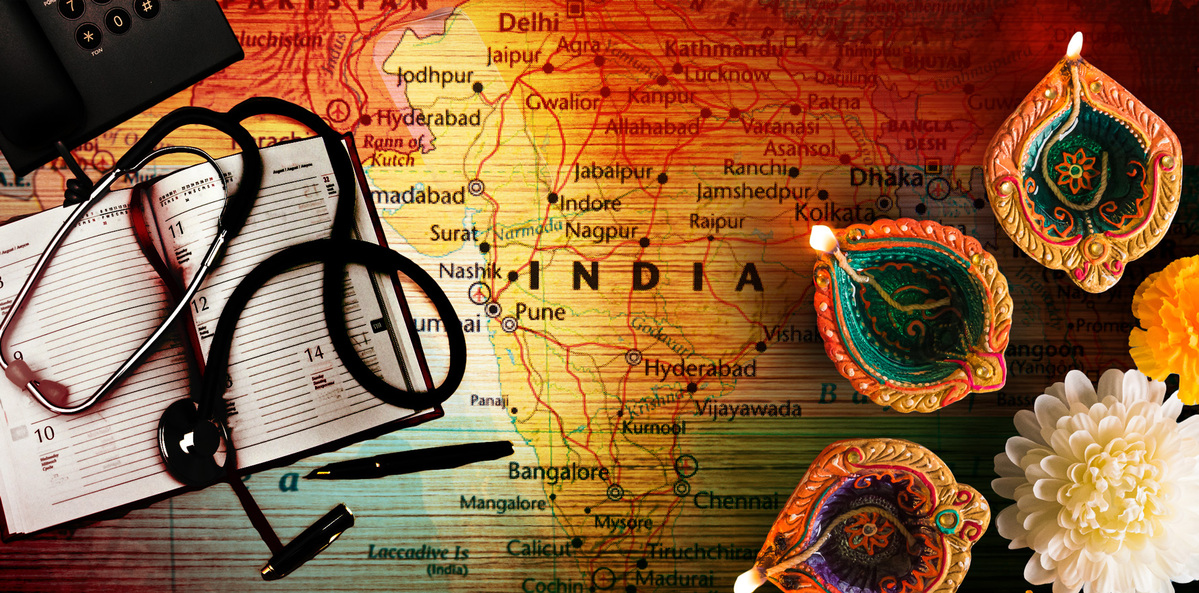Dislocated from my Indian identity and heritage, it’s work that makes me feel most connected – another of medicine's unexpected gifts.
A patient recently said to me: “In another life, I think we would have probably been friends.”
That was followed by “Actually, how come we haven’t crossed paths socially before?” She’s a young Indian woman born the same year as me. I can understand the intent behind her question, but the truth is I am so disengaged from the Indian community that conceivably the only way we would have crossed paths is accidentally.
Mine is a classic narrative of cultural dichotomy and insecurity of personal identity. English is my third language, but like many people raised in Western countries, it has overwhelmingly taken the lead in my daily life over the other languages. When I dreamt in Tamil a few months ago, my mother was as astonished as I was. There is little opportunity these days to speak Tamil and Kannada other than with my parents, and even then, it is with deliberate intent and unending errors of vocabulary and grammar.
I am even further removed from my community due to a lack of Indian friends. While nearly all of my friends are bilingual, bicultural and/or ethnically diverse, none are the same as me (this is also true for specialty; while nearly all my friends are medical, none are GPs). It has no significance to any of us. I had a traditional house-warming pooja and my friends all attended and participated as my mother explained the rituals. My friends brought fruit and flowers and sweets and have always shared these rare but important cultural moments of my life. I am not lacking or wanting, but I acknowledge that I do not have a single friend who speaks the same mother tongue as me.
I am in some bizarre hypocritical state of cultural anarchy. I have dual citizenship but it’s almost a decade since I last went to India. I would eat south Indian food daily if I could, but do not know how to cook it. I have three family members in this entire country; my parents and my brother, and their lifestyles, views and beliefs are so progressive that I think they equally struggle with cultural identity. I have only been to one Indian wedding in my life. I live in a suburb that has less than 2% of its demography as Indian-origin and no Indian grocery shops. I am some disappointing form of Indian-Lite, but would describe myself as Indian before I describe myself as Australian, and so I obsessively read Jhumpa Lahiri and Arundhati Roy and Vikram Seth in some attempt to navigate the anguish of accepting cultural dissonance.
The peculiar situation is that I am actually most connected to my culture and people in my professional life. Indian colleagues and associates – I have plenty. The GP I work with most closely at my practice is a young Indian man; we cover each other’s patients if we are on leave, we try to hand over to each other for continuity, and we have the most similar practice styles. Many of my most-referred-to specialists are Indian origin and I rather enjoy the small cultural commonalities that seep into these professional relationships. A lovely Indian gastroenterologist once referred to me as “Pallavi-ji” in a text; I escalated to my mother to ask what this meant and was delighted to learn he was using a term of respect.
The most cultural impact, though, has come from treating Indian patients. The majority of my patients are not Indian; it is only a small portion of my patient load and is a mix of first- and second-generation immigrant millennials, middle-aged and older adults (likely after their previous beloved Indian GPs retired) and visiting parents and grandparents from overseas (usually to help with a new baby).
My parents’ GP of over 30 years is a wonderful Indian man who reads these articles I write (hi doc!). Unlike me, his patient load is almost entirely people of sub-Indian continent background. He speaks many Indian languages fluently and is very well known in the southeastern suburbs. During the waves of migration in the 80s and 90s, many Indian families sought out Indian GPs and loyally continue in their care until they die, or the GP retires, and this is probably the situation of my parents and their GP.
It would be absolutely bewildering and amusing to many older Indian GPs when I describe a proud moment of doing a consultation in Kannada with a tiny elderly Pati (grandmother) visiting from India. Honestly, it’s a bit stupid even as I write it now, but it was such a special moment for me that I called my parents on the drive home to tell them. The woman was visiting from Bangalore, where my family comes from, and was overjoyed to find a young south Indian woman doctor providing her emergency GP care. I described to her the neighbourhoods where my parents grew up, and reassured her that yes, I was quite tall (ethnically I am the 99th centile for height) but definitely biologically Indian.
As she left the clinic, she tearfully wrote down her address in Bangalore and asked me to visit next time I went. I don’t know if it was the language, or that she reminded me of grandmothers that I did not have in this world any more, or if perhaps I just felt seen in my cultural identity, but the interaction has stayed with me for years.
All of the casual cultural references that happen in patient consultations stay with me. One year on Deepavali, I was late at clinic trying to sort out a sick seven-year-old with a likely perforated appendicitis. This child and family, also south Indian, were not known to our clinic, but my very obviously south Indian Hindu name seemed to provide some reassurance for them and hence they had asked to be booked specifically with me.
Days later, after I had completely forgotten about the child, I was moved to find a box of Indian sweets had been left for me at reception with a lovely card to say thanks and apologies that I was late to Deepavali celebrations because of their sick child. Admittedly, Indian festivals of any kind only ever involve me going my parents’ house to be fed, and the only person who leaves Diwali sweets for me is actually an Asian anaesthetist friend of mine, but this Indian family did not know that. The assumption from my Indian patients that I share these same life experiences and cultural commonalities is really special, because overwhelmingly I don’t.
I would have forgotten to wish my mum a Happy Ugadi (new year) if a patient hadn’t wished me first. I also forgot Indian Independence Day until an Indian patient asked if I was intentionally wearing green pants for the Indian flag (no). Indian Republic Day is easy (it’s the same as Australia Day; 26 January) but doesn’t have as much fanfare (food) as the others. I’m writing this piece during Navaratri, our nine-day festival that includes worship of Saraswati, the Goddess of knowledge, music, art, and learning. Of course, I forgot about this, too, until I realised that a newborn I just treated named Saraswati was probably called that because she was born on the first day of Navaratri.
Medicine constantly provides little gifts to us but helping me connect with my cultural identity was not one I ever expected. Yet again, I am affirmed that personal growth and development of our humanity cannot be separated from our professional identity as doctors. And as I become better at understanding and appreciating my Indianness, it is medicine that I have to thank. Happy Deepavali.
Dr Pallavi Prathivadi is a Melbourne GP and an adjunct senior lecturer at Monash University, with a PhD in safe opioid prescribing. She was a Fulbright Scholar at the Stanford University School of Medicine in 2020-2021 and the 2019 RACGP National Registrar of the Year.




